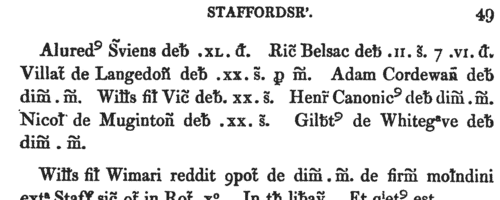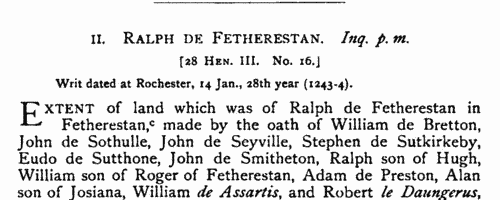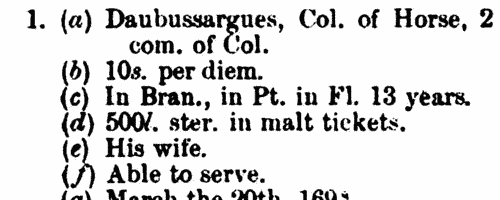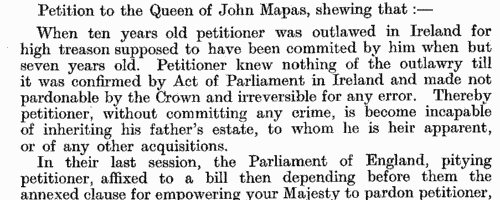Boniface Surname Ancestry ResultsOur indexes 1000-1999 include entries for the spelling 'boniface'. In the period you have requested, we have the following 121 records (displaying 1 to 10): Single Surname Subscription | | | Buying all 121 results of this search individually would cost £658.00. But you can have free access to all 121 records for a year, to view, to save and print, for £100. Save £558.00. More... |
These sample scans are from the original record. You will get scans of the full pages or articles where the surname you searched for has been found. Your web browser may prevent the sample windows from opening; in this case please change your browser settings to allow pop-up windows from this site. Pipe Roll
(1201-1202)
The Great Rolls of the Pipe are the central record of the crown compiling returns of income and expenditure from the sheriffs and farmers of the various English counties or shires. This is the oldest series of public records, and the earliest surviving instances of many surnames are found in the Pipe Rolls. Two sets of pipe rolls were prepared, not exact duplicates, the main series being the Treasurer's or Exchequer rolls, the copies (of which fewer have survived) being the Chancellor's rolls. The Chancellor's roll (or Antigraphum) for the 3rd year of king John became separated from that series at some date, and found its way to the miscellaneous records in the Chapter House at Westminster. As it happens, the Chancellor's roll for that year is in a better state of preservation than the Treasurer's roll, so it was chosen for publication by the Commissioners on the Public Records of the Kingdom, by whom it was printed in extenso in 1833. BONIFACE. Cost: £4.00.  | Sample scan, click to enlarge

| Liberate Rolls
(1240-1245)
These chancery liberate rolls of the 25th to 29th years of the reign of Henry III of England record the details of payments and allowances as part of the administration of government. Most entries start with the Latin words 'liberate', meaning 'deliver', or 'allocate', meaning allow. There are also 'contrabreves', warrants mainly to sheriffs of shires, assigning them tasks and allowing expenses. Most of the entries relate to England and Wales, but there are occasional references to Ireland and the English possessions in France.BONIFACE. Cost: £4.00.  | Sample scan, click to enlarge

| Yorkshire Inquisitions
(1241-1283)
Inquisitions post mortem are inquiries as to the real estate and heir of each person holding in capite or in chief, i. e. directly, from the Crown, or whose estates had been escheated or were in ward. The age and relationship of the heir are usually recorded. Inquisitions ad quod damnum enquired as to any activities (including maladministration by local officials) that had resulted in any material loss to the Crown. Both sets of inquisitions for this period were edited by William Brown for the Yorkshire Archaeological and Topographical Association, and printed in 1891. This index covers all names mentioned, including jurors, tenants, &c. BONIFACE. Cost: £4.00.  | Sample scan, click to enlarge

| Close Rolls
(1343-1346)
The close rolls of the 17th, 18th and 19th years of the reign of king Edward III record the main artery of government administration in England, the orders sent out day by day to individual officers, especially sheriffs of shires: they are an exceptionally rich source for so early a period. There is also some material relating to Wales, Scotland, Ireland and the English possessions in France.BONIFACE. Cost: £4.00.  | Sample scan, click to enlarge

| Secretary of State's Papers
(1600)
The letters and papers of sir Robert Cecil, Secretary of State, deal with all manner of government business in England, Ireland and abroad.BONIFACE. Cost: £4.00.  | Sample scan, click to enlarge

| Surrey Sessions
(1661-1663)
Surrey Sessions Rolls and Order Books. These are abstracts of sessional orders, minutes of criminal cases, memoranda and other entries of record taken from the Order Books from October 1661 to January 1663, inclusive, and the Sessions Rolls for October 1661, January 1662, April 1662, July 1662, October 1662 and January 1663.BONIFACE. Cost: £4.00.  | Sample scan, click to enlarge

| Allegations for marriages in southern England
(1679-1687)
The province or archbishopric of Canterbury covered all England and Wales except for the northern counties in the four dioceses of the archbishopric of York (York, Durham, Chester and Carlisle). Marriage licences were generally issued by the local dioceses, but above them was the jurisdiction of the archbishop, exercised through his vicar-general. Where the prospective bride and groom were from different dioceses it would be expected that they obtain a licence from the archbishop; in practice, the archbishop residing at Lambeth, and the actual offices of the province being in London, which was itself split into myriad ecclesiastical jurisdictions, and spilled into adjoining dioceses, this facility was particularly resorted to by couples from London and the home counties, although there are quite a few entries referring to parties from further afield. The abstracts of the allegations given here usually state name, address (street in London, or parish), age, and condition of bride and groom; and sometimes the name, address and occupation of the friend or relative filing the occupation. Where parental consent was necessary, a mother's or father's name may be given. The ages shown should be treated with caution; ages above 21 tended to be reduced, doubtless for cosmetic reasons; ages under 21 tended to be increased, particularly to avoid requiring parental consent; a simple statement 'aged 21' may merely mean 'of full age' and indicate any age from 21 upwards. These are merely allegations to obtain licences; although nearly all will have resulted in the issuing of the licence, many licences did not then result in marriage. BONIFACE. Cost: £4.00.  | Sample scan, click to enlarge

| Official Papers
(1698)
The State Papers Domestic cover all manner of business relating to Britain, Ireland and the colonies, conducted in the office of the Secretary of State as well as other miscellaneous records. Includes lists of passes to travel abroad.
BONIFACE. Cost: £4.00.  | Sample scan, click to enlarge

| Irish Pensioners of William III's Huguenot Regiments: Galloway's Regiment
(1702)
From an original return in Miscellaneous Bundle 17 of the Civil List books preserved in the Public Record Office, William A. Shaw prepared this abstract, published in 1902. The paper itself was entitled 'Abstract of the Examination of the French Pensioners now on the Civil List of the Establishment of Ireland'. The return was in book form with very wide pages, each folio or spread divided into eight columns. In his abstract the first number is the folio number; (a) is the name and station of the pensioner, either by first commission, second, or incorporated by warrant; (b) allowance on the establishment per diem; (c) where served and how long; (d) what substance and in what it consists; (e) what family they maintain; (f) able or not to serve, and why not; (g) when disbanded. In some cases some of the columns are blank in the original, and are ignored in this abstract. The least informative entries give just surname and rate of pension. Christian names are rarely given. The return is divided into two sections - Galloway's Regiment, and Old Pensioners. The latter include some women, presumably widows. The return was forwarded to the Lords Justices of Ireland as an appendix to a report, dated 29 June 1702, from Charles Dering, Auditor-General of Ireland. In all there were 590 pensioners, 398 being in Galloway's Regiment. Dering provided an analysis of the return, and annotated with an asterisk those 'absent out of the kingdom, dead or otherwised provided for, whose names are in the abstract blank'; with a dagger those 'that have been placed on the establishment by his late Majesty's warrants & have not served'; and with a double dagger those 'that have pensions above their stations markt upon the abstract.'
BONIFACE. Cost: £4.00.  | Sample scan, click to enlarge

| State Papers Domestic
(1702-1703)
The State Papers Domestic cover all manner of business relating to Britain, Ireland and the colonies, conducted in the office of the Secretary of State, as well as other miscellaneous records. 1 March 1702 to 31 May 1703. The calendar was prepared by Robert Pentland Mahaffy, with certain classes of document extracted and placed in separate appendices (called Tables): I, caveats; II, church and university appointments, &c.; III, commissions, warrants for commissions, notes of commissions and notes of warrants for commissions in the English army for 1702; IV, lord lieutenants and deputy lieutenants; V, Irish warrants; VI, weekly lists of ships of the Home Fleet with their stations and orders; VII, passes, notes of passes, post warrants and licences of absence; VIII, orders on petitions; IX, Scottish warrants and commissions; and X, miscellaneous royal warrants (to the Attorney or Solicitor General; in criminal cases; diplomatic; military warrants; miscellaneous warrants; secretary's warrants, allowance of bills, &c.; and notes of warrants for the appointment of almsmen). The source material in the Public Record Office that he drew on in making this compilation is referenced throughout, and is from the State Papers Domestic (and Military, Naval, Signet Office, Various, and Letter Books and Entry Books), State Papers Scotland (Correspondence, Letter Books and Warrants), State Papers Ireland (and King's Letter Books), and State Papers Channel Islands.
BONIFACE. Cost: £4.00.  | Sample scan, click to enlarge

|
Research your ancestry, family history, genealogy and one-name study by direct access to original records and archives indexed by surname.
|












